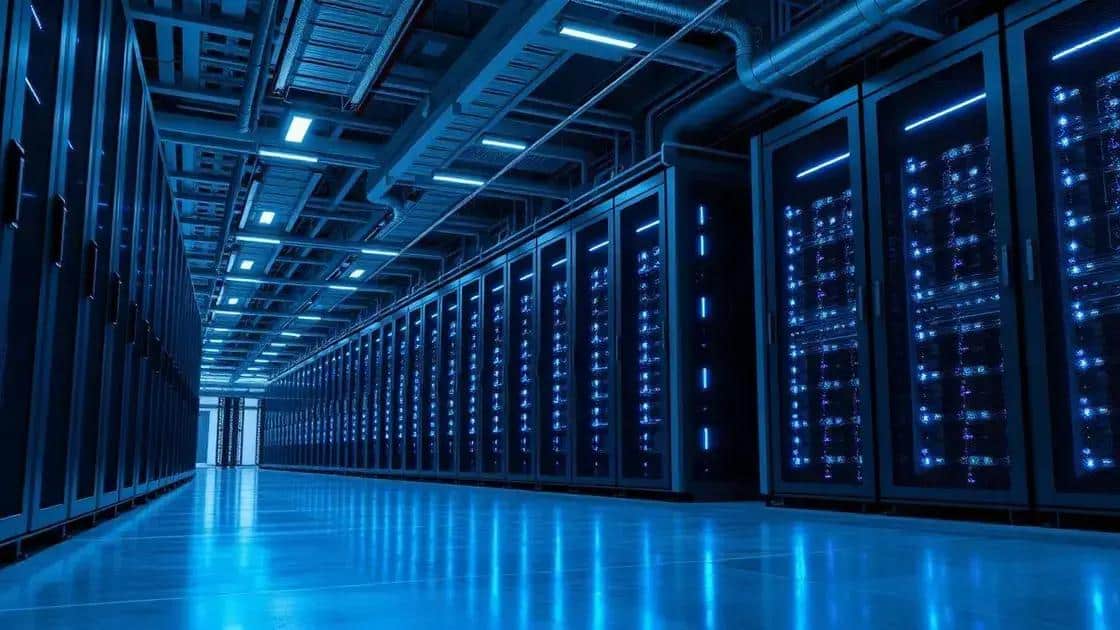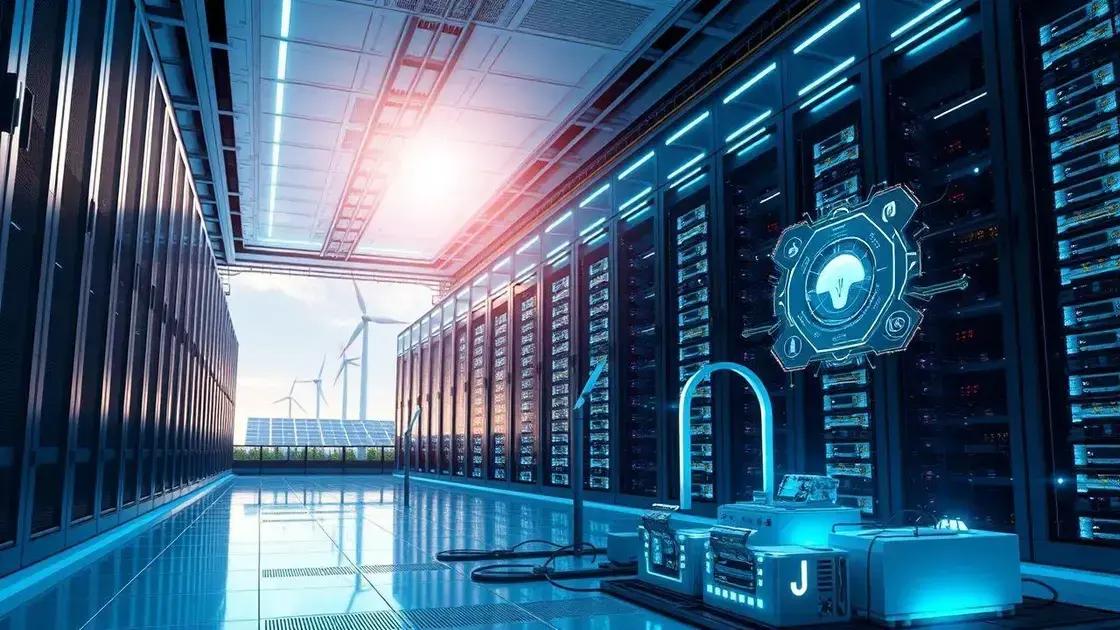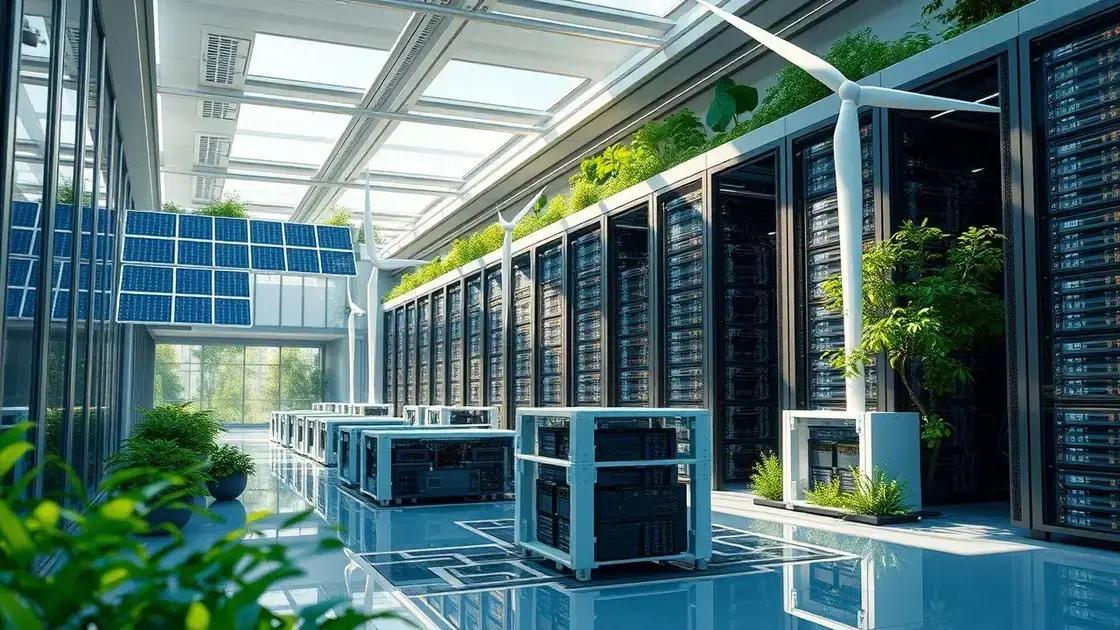Data center efficiency news trends: What to watch

Data center efficiency includes optimizing energy usage and cooling, integrating AI technologies, utilizing renewable energy sources, and adopting modular designs to enhance performance and sustainability.
Data center efficiency news trends are crucial for anyone interested in technology and its evolution. As industries evolve, the way we manage our data centers plays a key role in sustainability and performance. Curious how these trends affect your business or organization?
Understanding data center efficiency
Data center efficiency is essential in today’s technology-driven world. Optimizing operations can lead to significant cost savings and improved performance. As businesses grow, understanding data center efficiency becomes increasingly important.
What is Data Center Efficiency?
Data center efficiency refers to how effectively a data center uses resources, particularly in terms of power usage and cooling. High efficiency allows for better performance and sustainability. It ultimately decreases operating costs while improving service delivery.
Key Factors Influencing Efficiency
- Energy Management: Effective energy use reduces waste and promotes sustainability.
- Cooling Solutions: Proper cooling techniques can minimize energy consumption.
- Virtualization: Reduces the number of physical servers required by maximizing resources.
- Monitoring Tools: Tools help identify inefficiencies and areas for improvement.
By focusing on these factors, organizations can enhance their data center operations. Integrating efficient practices into day-to-day processes typically leads to better energy consumption and reduced costs.
The adoption of renewable energy sources also plays a role in improving data center efficiency. By switching to solar or wind energy, companies can reduce their carbon footprint and dependence on traditional power sources.
Moreover, regular assessments of technology are vital. Outdated equipment can lead to inefficiencies, making it essential to invest in up-to-date solutions that enhance performance. Emerging technologies, such as AI and machine learning, can also optimize operations.
As businesses prioritize efficiency, a culture of continuous improvement is cultivated. Employees become more aware of resource usage, leading to innovative ideas that increase productivity.
Current trends shaping efficiency

Current trends are significantly impacting data center efficiency. Staying updated on these shifts is essential for businesses looking to optimize performance and reduce costs. One major trend is the shift to green technology. Companies increasingly adopt sustainable practices like using renewable energy sources to power their data centers.
Adoption of AI and Automation
Artificial intelligence (AI) plays a pivotal role in managing resources more effectively. AI algorithms analyze data to optimize cooling and power usage, resulting in significant savings. Automation also reduces manual tasks, allowing teams to focus on strategic initiatives rather than routine monitoring.
Edge Computing
The rise of edge computing is another trend reshaping efficiency. By processing data closer to where it is generated, organizations can reduce latency and bandwidth usage. This shift not only enhances user experience but also improves operational efficiency.
- Reduced Latency: Processing data at the edge speeds up response times.
- Lower Bandwidth Costs: Less data needs to be sent to central data centers.
- Improved Reliability: Edge solutions ensure continued performance even if the central data center experiences issues.
Another significant factor in enhancing efficiency is modular data centers. These facilities can be quickly deployed and scaled as needed, allowing organizations to respond rapidly to changing demands. This flexibility ensures that businesses only utilize the resources they require, leading to cost savings.
Management tools are also evolving. Advanced software solutions provide real-time insights into system performance, enabling proactive maintenance and optimization strategies. This shift toward dynamic management means that inefficiencies can be addressed as they arise.
As these trends become more ingrained, companies embracing them will likely see a considerable return on investment. Understanding how these evolving practices influence data center efficiency can pave the way for successful operational strategies and long-term sustainability.
Technologies enhancing data center performance
Technologies play a vital role in enhancing data center performance. Embracing new innovations can lead to significant improvements in efficiency, reliability, and cost savings. With the rapid advancement of technology, data centers have more options than ever to boost their operations.
High-Efficiency Power Supplies
One of the key components for improving efficiency is the use of high-efficiency power supplies. These power supplies convert electricity more effectively, causing less energy waste. This shift not only reduces operating costs but also minimizes the carbon footprint of data centers.
Advanced Cooling Solutions
Cooling is another area where technology greatly impacts performance. Traditional cooling systems can be energy-intensive. Newer systems, such as liquid cooling or hot aisle containment, significantly enhance efficiency by directing cold air exactly where it is needed.
- Liquid Cooling: Directly cools servers, leading to lower energy use.
- Hot Aisle Containment: Keeps hot air from escaping, improving overall cooling efficiency.
- Adaptive Cooling: Adjusts cooling based on real-time data.
Additionally, automation tools have transformed how data centers operate. These tools use AI to analyze data and manage resources more effectively. With automated systems, data centers can monitor performance and make adjustments automatically, leading to enhanced reliability and reduced downtime.
Another exciting development is the integration of machine learning in data management. This technology can predict workloads and optimize resource allocation, ensuring that each server is running at its best. By analyzing historical data, machine learning models can help data centers anticipate issues before they escalate.
Furthermore, the use of software-defined networking (SDN) allows for more flexible and scalable network management. With SDN, businesses can dynamically adjust their data routing without hardware changes, saving time and reducing costs.
Investing in these technologies not only fosters a more efficient data center environment but also prepares businesses for future growth. As the technological landscape continues to evolve, staying ahead of the curve is essential for long-term success.
Future predictions for data centers

The future of data centers is exciting and filled with potential innovations. Anticipating the upcoming trends is essential for companies aiming to enhance data center efficiency and performance. One significant prediction is a greater emphasis on sustainability. As environmental concerns grow, data centers will adopt greener technologies and practices.
Increased Use of Renewable Energy
More data centers will transition to renewable energy sources. Solar and wind energy are becoming more viable options, as they lower the carbon footprint. With this shift, companies can expect cost savings and a more sustainable operational model.
AI and Machine Learning Integration
Integrating AI and machine learning into data center operations will take efficiency to new levels. These technologies can automate many tasks, from resource allocation to predictive maintenance. As they evolve, they will help data centers respond more rapidly to changing demands.
- Predictive Maintenance: AI can anticipate equipment failures, allowing for timely interventions.
- Dynamic Resource Allocation: Optimizes server usage based on real-time data.
- Enhanced Security: Machine learning algorithms can detect anomalies and threats, improving data security.
Edge computing will also play a crucial role in the future landscape of data centers. By processing data closer to the source, businesses can achieve reduced latency and improved performance. This trend is especially vital for applications requiring real-time data processing.
The rise of modular and scalable data center designs is another trend to watch. These facilities allow for quick adjustments to capacity and resource needs, making them perfect for supporting growing businesses. Companies can rapidly scale their operations without significant upfront investments in infrastructure.
Data center virtualization will continue to expand, enabling better resource utilization and flexibility. This approach allows for multiple virtual servers to run on a single physical device, maximizing efficiency.
Finally, as cyber threats grow more sophisticated, data centers will invest in robust security measures. Future predictions suggest that security will become a primary focus, integrating advanced technologies to protect sensitive information.
FAQ – Frequently Asked Questions about Data Center Efficiency
What is data center efficiency?
Data center efficiency refers to how well a data center uses its resources, such as energy and cooling, to maximize performance and reduce costs.
How can AI improve data center operations?
AI can enhance data center operations by automating tasks, predicting maintenance needs, and optimizing resource allocation for better efficiency.
What are some key trends in data center technology?
Key trends include the use of renewable energy, edge computing, AI integration, and advanced cooling solutions to boost efficiency.
Why is sustainability important for data centers?
Sustainability is crucial as it helps reduce the environmental impact of data centers, lowers operating costs, and enhances brand reputation.






